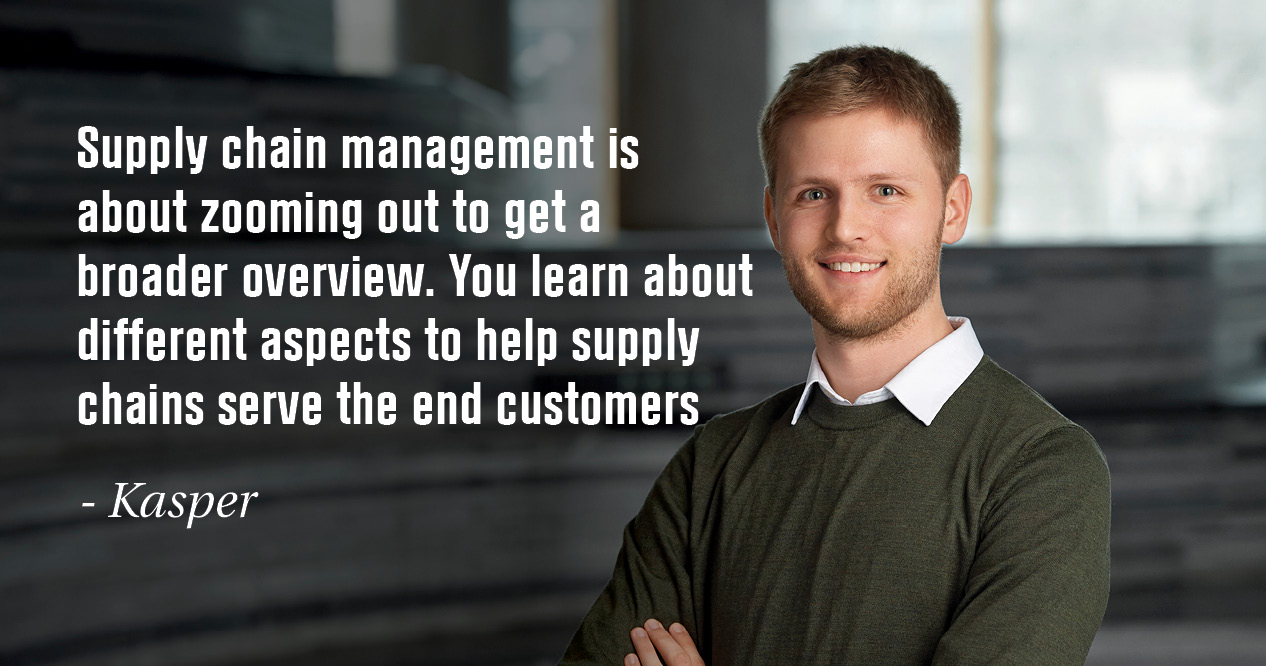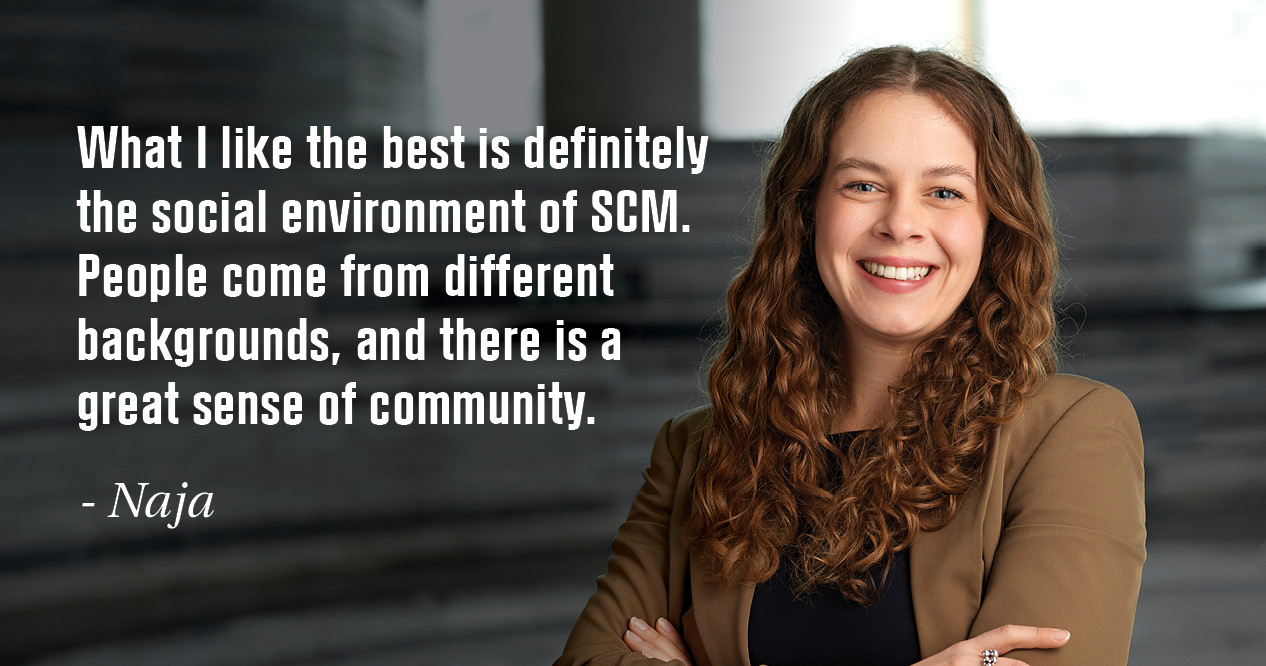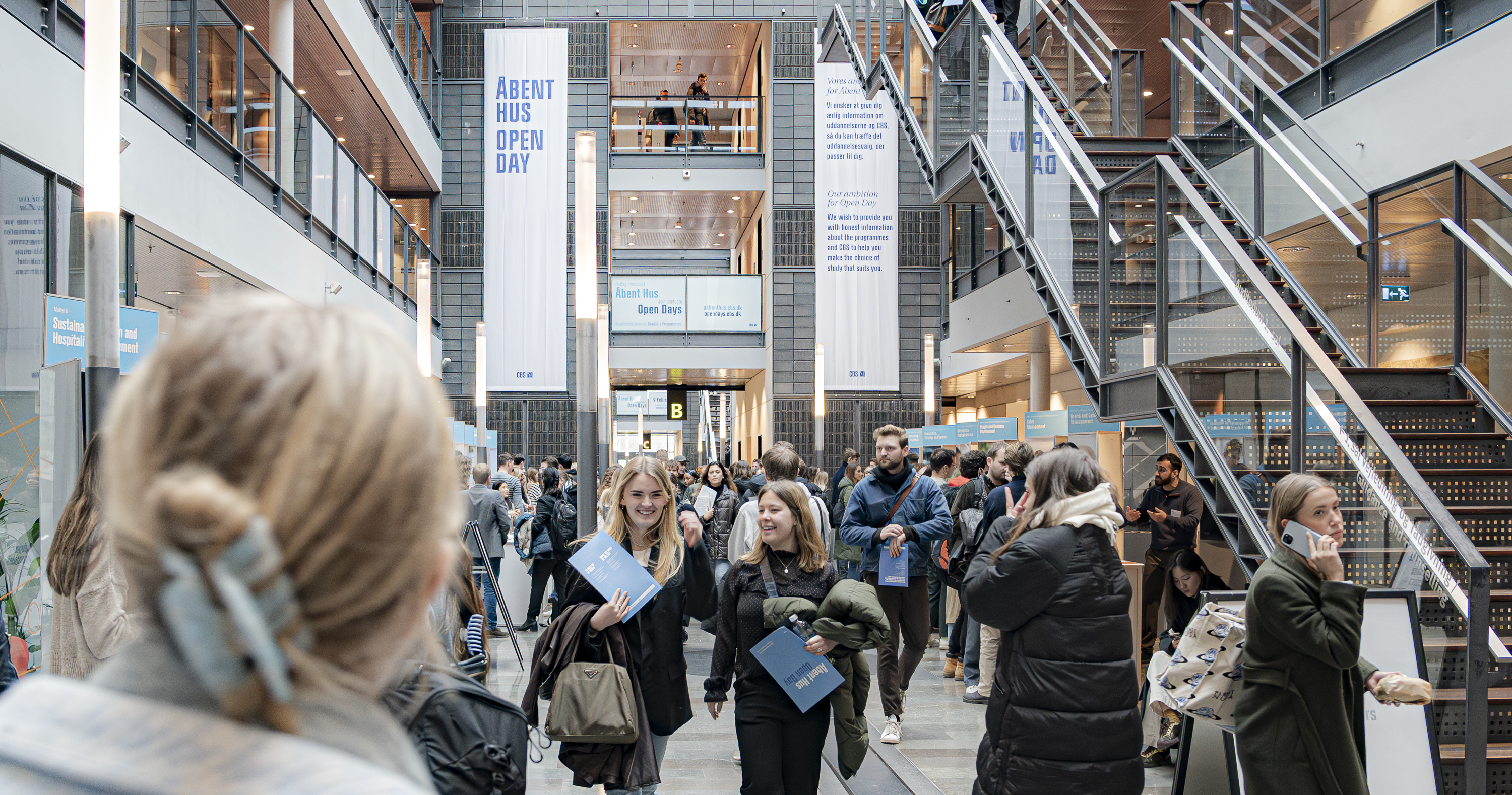Supply Chain Management
Part-time master (Erhvervskandidat)
What is a part-time master?
A part-time master is a full degree you study part time. This means that it will take you 4 years to complete rather than 2. This gives you the flexibility to combine a graduate programme with a relevant job at min. 25 hours a week.
The part-time master bridges theory and practice. You get the opportunity to connect what you learn at CBS directly with relevant tasks and projects at work. You can contribute with the newest academic knowledge at work, and you will get practical experience using that knowledge.
Contents and structure
The part-time master has the same academic content and level as the full-time equivalent. You will attain the same competencies and knowledge as the full-time version of the programme you are interested in.
Read more about the academic content of Supply Chain Management.
Structure
As a part-time student it will take you 4 years to complete the programme, divided over 8 semesters with 15 ECTS each semester. You can see an overview of the programme below.
| 1st sem | 2nd sem | 3rd sem | 4th sem | 5th sem | 6th sem | 7th and 8th sem |
| Value Creations in Global Supply Chains (7,5 ECTS) | Business Analytics – Data Driven Operations (7,5 ECTS) |
Electives
|
Electives
|
|
||
| Supply Chain Configuration – Decisions and Models (7,5 ECTS) |
Managing the Sustainable Supply Chain Transformation (7,5 ECTS) | Risk Management and Corporate Finance (7,5 ECTS) | Supply Chain Business Project (7,5 ECTS) |
You can read more about the programme, academic content and exams in the programme regulations for Supply Chain Management
Customise your programme
During the programme, you have various opportunities to create your own academic profile.
Electives
On the 3rd semester, you can choose to study courses of your specific interest. CBS offers a large number of electives within a wide range of topics. You can also choose to take electives at other Danish universities. The electives you choose have to be relevant for your programme.
See the current selection of CBS electives on Single courses and electives - Master
Minor
On the 3rd semester, you can also choose to study a so-called minor. A minor is a package of electives within a specific academic area. Typically, it consists of 3 courses. By taking a minor, you strengthen your competences within a specific area of interest, and you can use it to qualify for specific jobs or industries.
See the current selection of CBS minors on Minors
Master's thesis
Your 2nd year is completed with a master's thesis. You choose the topic you want to write about, which allows you to focus on a specific topic of your interest. Typically, you write your master's thesis with a fellow student.

Classes and preparation
Classes during the day
As a part-time student you will have classes together with the full-time students in the programme. Typically, classes are scheduled in the daytime Monday – Friday between 09:00 and 17:00. You can expect to have 6-9 class hours per week, divided between 2 to 4 classes. These will be spread out throughout the week, so you might have classes e.g. Monday and Wednesday morning, as well as Thursday afternoon.
Mandatory assignments and group work
In some courses you will work in study groups, where you e.g. have to prepare a presentation or write an assignment together. Your study group may consist of both part-time and full-time students.
In some of your mandatory courses you need to pass certain mandatory activities or assignments during class as a pre-requisite for participating in the exam. On Supply Chain Management the mandatory assignments can be home assignments done invidivually or in groups and oral presensations.
Preparation for classes
Your lecturers will expect you to show up prepared for classes. This means that you have done the reading for the class or sometimes prepared a case. Classes are planned with the assumption that students are prepared for the topic or theory you will be working on in class. Preparation is the key to getting as much out of your studies as you can.
You should expect to spend 10 hours per week on average on preparation for classes. This could both be on your own and in groups. You might spend less time at the start of the semester, and more in the time leading up to an exam.
Flexibility between work and studies
We expect you to show up and actively participate in your classes, so it is important that you and your employer have an understanding to make sure that you have the flexibility and time for your studies.
Please note that classes will not be recorded and will not be scheduled outside of regular working hours as is the case for e.g. diploma or other part-time masters.
Read more on Teaching and working methods.
Time table
Your time table can vary from week to week. See two examples of what a time table for a typical week might look like:

Admission
The admission process and entry requirements for the part-time master are the same as for the full-time programme. There is not a set number og places reserved for part-time students, and therefore, it is not easier nor harder to get into the part-time master.
When you apply for admission the part-time master, you need to
- fulfil all the entry requirements
- Select you are applying for part-time master (Supply Chain Management – part-time) in the application portal.
- Document relevant employment of at least 25 hours a week.
Requirements for employment
To be eligible for a part-time master, you must be employed within a relevant field and work at least 25 hours a week.
You cannot find an exact list of what relevant employment is for Supply Chain Management, but the work has to be within the field of business economics and administration. If you are in doubt, you can find inspiration for what could constitute relevant fields of employment by looking at the career information for SCM or the competence profile for SCM
Are you in relevant employment by the application deadline 1 March?
If you are in relevant employment by the application deadline 1 March, you must upload "the employment agreement form" as documentation in the application portal.
Are you not in relevant employment by the application deadline 1 March?
If you do not yet have an agreement with a company by the application deadline 1 March, you can instead upload a letter explaining how you will get relevant employment no later than 1 August.
When you have found relevant employment, you must upload "the employment agreement form" in the application portal by 1 August.
If you have been offered a place on the part-time master, but do not upload "the employment agreement form" by 1 August, you will be admitted to the full-time programme instead.
Documentation
You must fil out and upload the employment agreement form in the application portal.
Please note, your employment contract cannot be used as documentation for relevant employment.
CBS is empowered to obtain information from SKAT (the Danish Tax Agency) in order to verify and support the information provided in the employment agreement form.
Who can apply?
You can only apply for the part-time master, if you
- are a citizen of an EU/EEA country or Switzerland
- are not a citizen of an EU/EEA country or Switzerland, but you do not need a student residence permit to live and study in Denmark
If you need a student residence permit to study in Denmark, you cannot apply for the part-time master.
Find more information on the page Deadlines > When and how do I apply.
Changing between full-time and part-time
You can apply to change between the part-time and full-time programme during your studies.
You can always change from being a part-time student to being a full-time student in the same programme if you need to.
You should note, however, that you are not guaranteed the option to change back to being a part-time student again.
You can apply to change from the full-time programme to the part-time master. However, we cannot guarantee that it will be possible for you to change.
You can read more about changing from full-time to part-time on CBS' student intranet, my.cbs.dk, once you have been admitted.
Salary and SU
As a part-time student you are not eligible to receive SU as you are paid a regular salary from your employer. You have to negotiate your own salary with your employer. Please note that the salary should reflect your level of education and competencies.
In need of special educational support?
You should note that you cannot receive Special Educational Support, SPS, in a part-time programme. The reason is that the part-time programme is not eligible for SU, and this is a requirement in order to receive SPS. You can still apply for special conditions e.g. at exams.
Read more about Special Educational Support.
Tuition and other payment
You do not have to pay tuition in order to study a part-time master.
However, if you are not an EU/EAA citizen, you have to pay an application and tuition fee, as for any other graduate programme.
Read more about tuition and application fee.
Information for the employer
The part-time master programme was developed in order to meet a demand from students and companies for more flexibility in the educational system, and better options for combining a master programme with relevant work.
By hiring a part-time master student your company gets highly qualified employee while they are still studying.
They can contribute with:
- new knowledge, theoretical and methodological input.
- new perspectives on your organisation.
- contact to the education and research environments at CBS.
- contact to the student environment at CBS, which could e.g. be used inconnection with future recruitment.
A part-time master is a commitment for all parties in terms of time, commitment and planning.
For your employee it is a learning proces where the complexity and difficulty of the tasks should match what you would expect from an employee with a finished bachelor or diploma degree. The tasks themselves should reflect the competencies the student has and will develop during their 4-year master programme.
Flexibility between work and studies
The company is expected to include the student on the same terms as any other full-time employee. But at the same time there must be a level of flexibility to allow the student to prepare for and attend classes during the day and participate in exams.
Requirements for employment
To study a part-time master at CBS it is required that:
- The student must have an employment contract with your company for at least 25 hours a week on average.
- Be employed based on a relevant bachelor’s degree or other equivalent Danish or foreign education at the same level.
Documentation for employment
To be admitted to the part-time master programme the student must provide documentation that confirms employment for at least 25 hours a week on average.
Twice a year, the student must renew this documentation in order to remain enrolled in the programme.
Salary and other terms of employment
Salary is negotiated between the employee and the employer as normal. Please note that part-time students are not eligible for SU. Therefore, the salary should reflect their level of education and competencies.
Changes in employment or tasks
Both the company and the student can end the employment at any time as normal. You are not obligated to keep the student employed for the full 4 years. If the student no longer can document relevant employment at at least 25 hours a week, they can be transferred to the full-time version of the programme and continue their studies full-time instead.
The student can be assigned new responsibilities during the 4-year period. These still have to be relevant for the programme, as that is a requirement for studying a part-time master.
If there are changes in employment status or significant changes to responsibilities, the students has to inform CBS of these changes.






